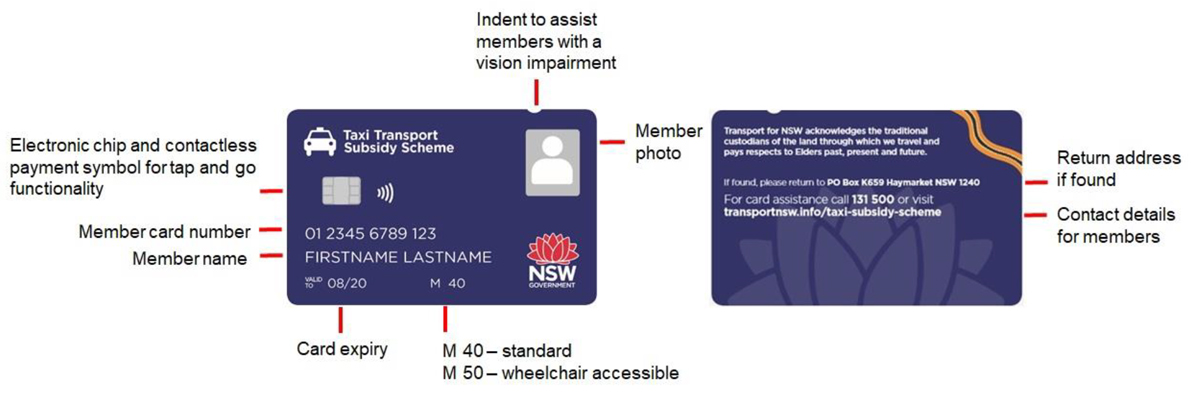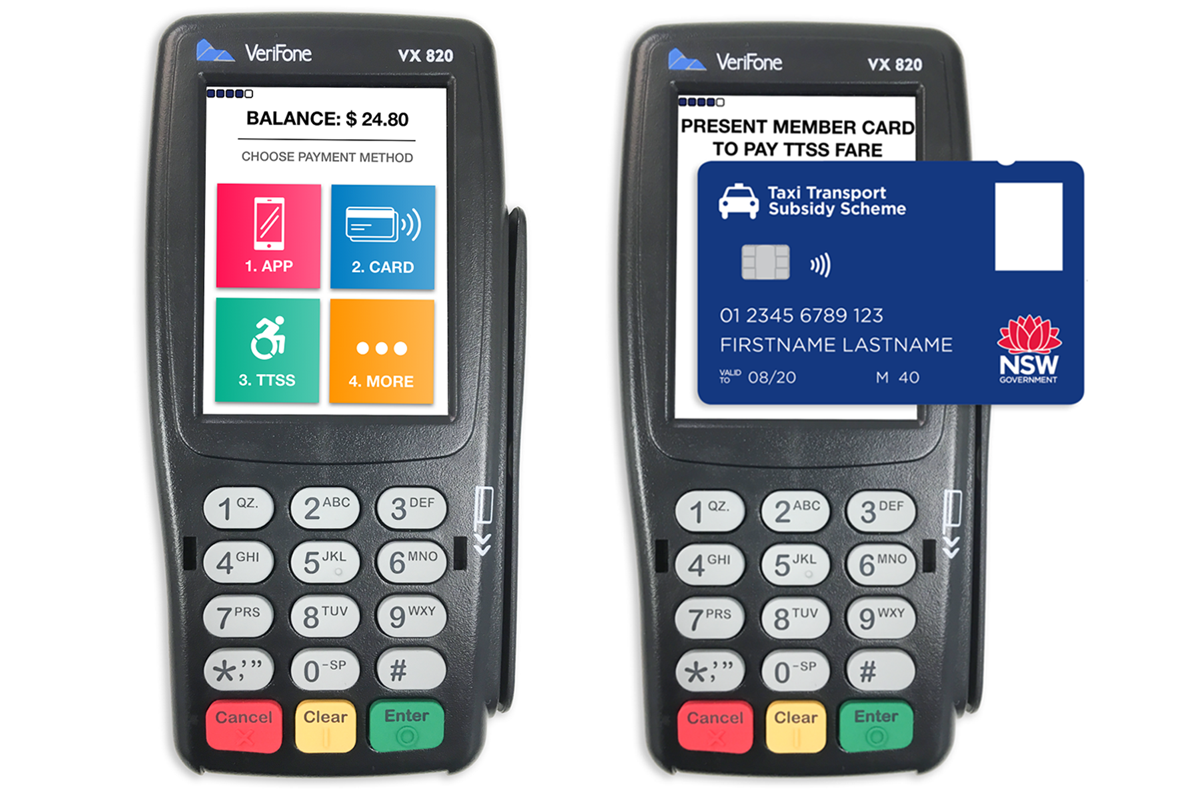Taxi Transport Subsidy Scheme
Overview
NSW taxi drivers have been assisting people with disabilities to travel using the Taxi Transport Subsidy Scheme (TTSS) since 1981.
The scheme provides subsidised fares to eligible participants who are unable to use public transport because of a qualifying severe and permanent disability.
The taxi fare subsidy provided under the scheme is up to 50% of the total metered fare to a maximum of $60 per trip.
The subsidy can be claimed using a TTSS Smartcard in taxis with a Cabcharge payment terminal or a paper travel docket.
The subsidy can only be claimed when a participant is present in the taxi and can only be claimed once per trip where multiple scheme participants are travelling together.
Drivers must not refuse to accept a TTSS participant’s smartcard, paper docket (if a Cabcharge terminal is not available), or interstate travel docket (for taxi travel in other states and territories or from visitors to NSW).
Paper dockets
Note: New docket books will be launched on October 1. They will be blue in colour. Old docket books will no longer be accepted after November 30, 2025.
Paper travel dockets can only be used by TTSS participant or their carer while they are travelling together in a taxi not equipped with a Cabcharge payment terminal.
Paper dockets must be completed using a taxi driver’s drivers licence number and all relevant information regarding the subsidy, participant, the driver and the trip. If any information is missing, the trip will be rejected.
Please note, where paper docket misuse is suspected Transport for NSW may withhold TTSS payments to further investigate the matter.
TTSS Smartcards
The TTSS Smartcard works on Cabcharge payment terminals and is tapped at the end of the trip to authorise and deduct the subsidy component of a participant’s fare.
A TTSS Smartcard must only be used by the TTSS participant or their carer while they’re both travelling together in the taxi.
Please note, where TTSS Smartcard misuse is suspected Transport for NSW may withhold a TTSS payment while further investigating the matter.

Why a smartcard?
Participant benefits:
- Smartcards don’t require a particular companion device. For example, apps require a smartphone
- Smartcards don’t require complex technology to operate
- ‘Tap and go’ functionality is easy to use
- A smartcard is much easier to carry than a docket book.
Industry benefits
Drivers:
- The smartcard is easy and fast to use
- Payments are timely.
Taxi service providers:
- Reduced operational costs and faster payment settlements
- Less manual processing, collating, and postage of paper dockets
- Improved reporting and data capabilities
- More simple trip reconciliation processes
- Reduced risk of human and scanning errors.
Accepting the TTSS Smartcard
Payment terminals
The TTSS Smartcard can be used in taxis equipped with Cabcharge payment terminals.
When using a smartcard, the driver must enter their driver's licence number as their driver ID when logging into the terminal. If this information is missing, the trip will be rejected.
To process the TTSS portion of the participant’s fare a driver selects ‘TTSS’ on their payment terminal. The passenger or the driver taps the card on the device to deduct the TTSS component of the fare. The participant then pays the remaining portion of the fare.

Receiving the WATDIS (M50) payment
Drivers who operate a wheelchair accessible taxi receive a Wheelchair Accessible Taxi Driver Incentive Subsidy (WATDIS) for trips taken by TTSS participants who have been approved to travel in their wheelchair.
The following TTSS codes appear on the smartcard:
- M40 – standard taxi
- M50 – wheelchair accessible taxi
If the passenger is a M50 participant, the WATDIS is added to the trip electronically and will appear on the receipt as a WAT count.
Transport for NSW will make WATDIS payments once we validate that the vehicle was a wheelchair accessible taxi.
The WATDIS is currently a:
- $25 (excl. GST) standard day rate
- $30 (excl. GST) night rate from 10:00 PM to 6:00 AM, excluding public holidays.
- Flat public holiday rate of $50 (excl. GST) (applicable on the 11 public holidays listed under the Public Holidays Act 2010).
Please refer to the table below for a detailed breakdown of rates by day and time:
| Day | Standard day rate 06:00am to 10:00pm | Night rate 10:00pm to 06:00am |
|---|---|---|
| Monday | $25.00 | $30.00 |
| Tuesday | $25.00 | $30.00 |
| Wednesday | $25.00 | $30.00 |
| Thursday | $25.00 | $30.00 |
| Friday | $25.00 | $30.00 |
| Saturday | $25.00 | $30.00 |
| Sunday | $25.00 | $30.00 |
| Public Holiday | $50.00 | $50.00 |
Faulty TTSS Smartcards
In the unlikely event of a terminal outage or faulty smartcard, drivers can use a TTSS Emergency Docket.
Emergency dockets can only be used in limited circumstances. Please refer to the full instructions in the TTSS Smartcard – Guide for taxi service providers and drivers (PDF, 986.43 KB).
Original copies of completed Emergency Dockets should be mailed to:
Transport for NSW
PO Box K659
Haymarket NSW 1240
Expired TTSS Smartcards
The smartcards are valid for three years. The expiry date is printed on the front of the card.
The card expires on the final day of the month that is printed on the card. If a card has expired, it won’t work if it is tapped on or inserted into a payment terminal. Expired cards should not be accepted. TTSS participants are required to pay the full fare until they receive their replacement card.
Lost TTSS Smartcards
If a driver finds a TTSS Smartcard in their taxi or elsewhere, they should contact their taxi network to return it to the cardholder. Otherwise, they can post it to the address on the back of the card or call 131 500 to report it as lost.
Participants without smartcards
Participants have been advised that they can continue to use paper dockets until their TTSS Smartcard has been received.
Non-compatible payment terminals
In taxis where the payment terminal is not enabled to accept the TTSS Smartcard, participants can use a TTSS paper travel docket.
Interstate travel
The TTSS Smartcard cannot be used for taxi trips in other states. NSW TTSS participants will still need to use their paper interstate travel dockets for taxi travel in other states and territories.
Visitors to NSW can use their interstate dockets to claim a subsidised trip. The subsidy will be the same as applies in their home jurisdiction. Instructions to drivers will be included on the interstate docket on how to apply the interstate subsidy to the fare. Interstate dockets can be submitted through the same process as any NSW TTSS dockets.
Note: WATDIS payments do not apply to trips using interstate dockets.
TTSS participants travelling together
For each ride, one participant can use either their smartcard or paper docket (if a Cabcharge terminal is not available) to deduct the TTSS subsidy component of the fare. If applicable, the WATDIS payment will also be recorded. The remaining portion of the fare can be split between the participants.
If multiple passengers sharing the maxi-cab are M50 cardholders while only one participant can claim the TTSS subsidy, the driver can claim the WATDIS for each eligible M50 passenger by selecting the ‘CLAIM MULTIPLE WATDIS’ option on their EFTPOS machine. This allows each M50 participant to tap their smartcard to record the WATDIS for that trip. When claiming multiple WATDIS using dockets, complete one docket using the details of any one of the participants, mark the relevant boxes (‘TTSS Participants Travelling Together’ and ‘WAT Incentive Claim’), and record the details of the additional eligible M50 participants on the back of the docket.
Payment settlements
TTSS Smartcard transactions are recorded electronically. Funds from subsidies including WATDIS payments are validated and settled to the taxi service provider by Transport for NSW.
Settlement files showing trip details and transaction amounts are generated by Transport for NSW and made available to taxi service providers via the Transport Concessions system.
TTSS Smartcard payments are matched to the corresponding taxi plates and deposited into your bank account. This means it’s important to keep your list of plates updated in our system including when taxis are added or no longer in your fleet.
Please note, where smartcard misuse is suspected Transport for NSW may withhold TTSS payments to further investigate the matter.
Terms of use and regulations
The TTSS terms of use have been updated to accommodate the use of the new smartcard.
There is no change to the current Point to Point Transport (Taxis and Hire Vehicles) Regulation 2017.
